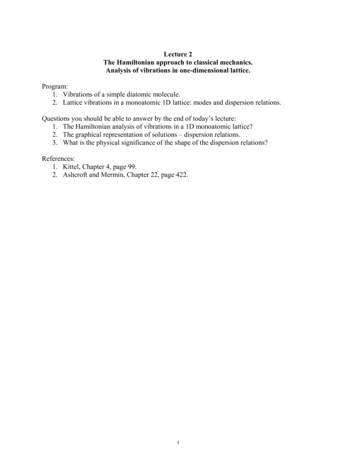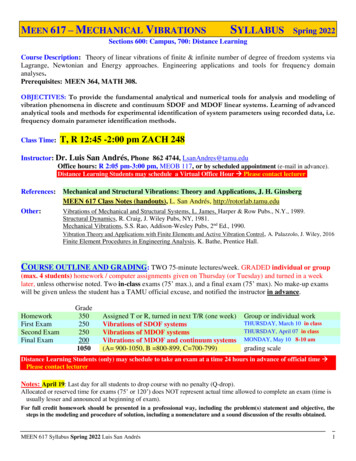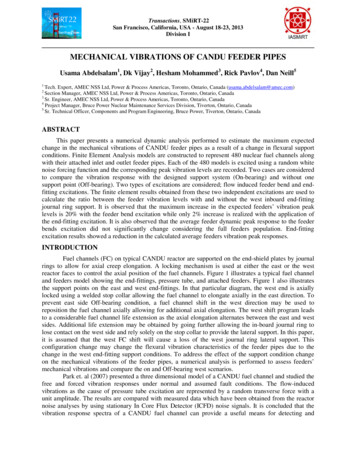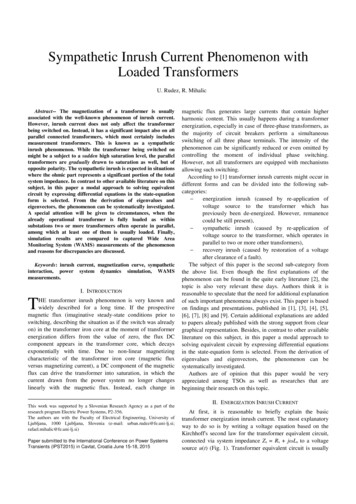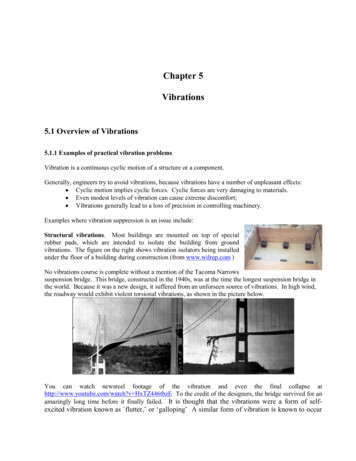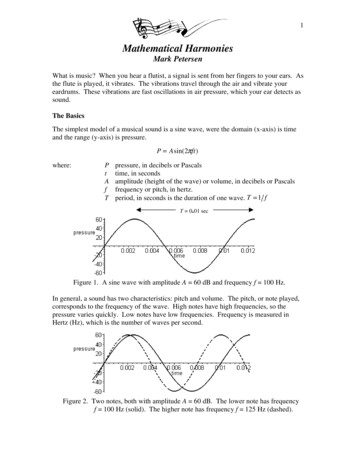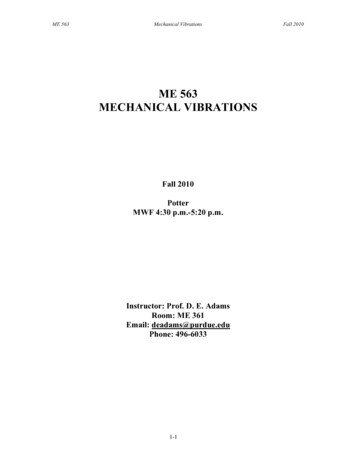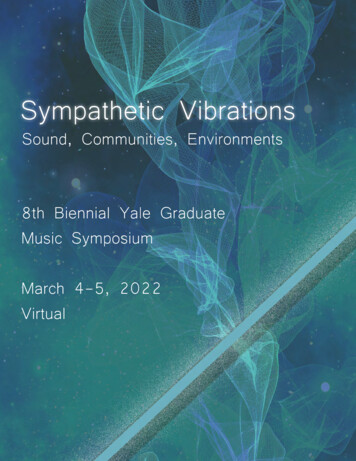
Transcription
Virtual
sympathetic vibrations: sound, communities,environmentsyale graduate music symposiummarch 4-5, 2022, virtualregistration hereCONFERENCE CHAIRSAllison Chu Áine Palmer hallie voulgarisThe YGMS 2022 chairs would like to thank the following individuals andcommittees for their support in the planning and execution of this conference:Ian Quinn, Chair of the Music Department Daniel Harrison, Director ofGraduate Studies, Music Department Kristine Kinsella, Department Registrar,Music Department Jennifer Gambaccini-Denillo, Assistant to the Chair Elaine Culmo and custodial staff Logistics and Catering Committee (PhilipBixby, Emily Korzeniewski, Jessica Sipe) Publicity and Website Committee(Nathan Smith, Chloe Smith, Alec Wood)YGMS 2022 is generously supported by a grant from the Yale GraduateSchool Dean’s Fund for Student-Organized Symposia.Yale University acknowledges that indigenous peoples and nations, including Mohegan,Mashantucket Pequot, Eastern Pequot, Schaghticoke, Golden Hill Paugussett, Niantic,and the Quinnipiac and other Algonquian speaking peoples, have stewarded throughgenerations the lands and waterways of what is now the state of Connecticut. We honorand respect the enduring relationship that exists between these peoples and nations andthis land.
schedule of eventsall times in ETfriday, march 411:45 A.M.Zoom room opens12:00-12:15Opening remarks from Daniel Harrison, Director of Graduate Studies12:15-1:45Digitizing Environments(Alec Wood, moderator)Lydia Wagenknecht (Colorado University-Boulder)Una conciencia antartica: Lluvia Ácida and the Politics of Polar IdentityLara Weaver (Queens University Belfast)Sounding and Ungrounding Sacred Spaces: Acousmatism, Site-SpecificPractice, and Resonating from AfarNatalie Farrell (University of Chicago)K. K. Covid-19: Temporality, Cultural Trauma, and the Animal Crossing: NewHorizons Soundtrack1:45-2:00Break2:00-3:30Workshop, Tavia Nyong’o (Yale University) and Braxton Shelley(Yale University)3:30-4:00Break4:00-5:30Constructing Religious Identities(Zac Stewart, moderator)C. E. Aaron (Yale Institute of Sacred Music)“Baby this melody will show you another way”: Janelle Monáe’s AfrofuturistWorldbuildingPhilip Oddi (York University)Taqwacore: Punk as a Secular, Social, and Religious CommentatorAlexandra Dreher (Yale Institute of Sacred Music)The Unsung Violence of a ‘Völkisch’ Hymnal
5:30-5:45Break6:15-7:15Reception and Happy Hoursaturday, march 59:00 A.M.Zoom room opens9:15-11:15Singing Together(Taryn Dubois, moderator)Bidisha Chakraborty (Banaras Hindu University)Songs of Power: A Study of Gaari GeetScott Gray Douglass (Pennsylvania State University)Fishers of Song: Community Music Education in MadagascarKatelyn Hearfield (University of Pennsylvania)Collective Trauma, Communal Singing: Musicking in Manchester inResponse to TerrorJennifer Sherrill (University of California-Davis)Singing for Siniparxi: Lessons on Contact Theory and CommunityBuilding from the Moria Refugee Camp11:15-11:30Break11:30-1:00 P.M.Performing Queerness(hallie voulgaris, moderator)Alexander F. Hardan (Brown University)“ Leader of the Free Spirit Camp”: The Queer Counterpublic of MarthaArgerichElizabeth Lawrensen (Stony Brook University)The Modern Body in Lil Nas X’s “Montero: Call Me By Your Name”Cana McGhee (Harvard University)Marbled Kweens: Digitally Performing Plant Parenthood1:00-2:30Lunch2:30-4:00Relocating Sound(Hannah Rosa Schiller, moderator)
Jessica Chow (Royal College of Art)Popular Syncopated Music: Elisabeth Welch and the Influence of JazzModernity in 1930s BritainJoshua Tolulope David (University of Toronto)Naija Hip-hop: Towards the Indigenization of Hip-hop Music in NigeriaJade Conlee (Yale University)Empire of Leisure: Race and Mobility in Martin Denny’s Musical Textures4:00-4:15Break4:15-5:45Keynote lecture, Jessica Bissett Perea (University ofCalifornia-Davis)5:45-5:50Closing remarks
biosJessica Bissett PereaDr. Jessica Bissett Perea is an interdisciplinary musician-scholar whose research,teaching, and service priorities are informed by her lived experiences and academictraining. She was born in Dgheyaytnu, or what is currently known as Anchorage, Alaska,and raised on her ancestral Dena’ina homelands forty miles north in the MatanuskaSusitna Valley. She is an enrolled member of the Knik Tribe and a shareholder in CookInlet Region, Inc. (an Alaska Native Corporation). She is a double bassist and vocalist andearned a Bachelors degree in Music Education, a Masters degree in Music History, and aPh.D. in Musicology.Jessica’s current projects include: co-directing the “Radical and Relational Approachesto Food Fermentation and Food Security” project in partnership with researchers fromIlisimatusarfik Kalaallit Nunaat (Nuuk, Greenland); and co-convening an Asia-PacificIndigenous Studies seminar in partnership with researchers from Universiti Malaya (KualaLumpur, Malaysia) and the APRU (Association of Pacific Rim) Indigenous KnowledgesWorking Group. Her book Sound Relations: Native Ways of Doing Music History in Alaska(Oxford University Press, 2021) delves into histories of Inuit musical life across a range ofgenres—from hip hop to Christian hymnody and drumsongs to funk and R&B—to amplifythe broader significance of sound as integral to Indigenous self-determination andresurgence movements.With her husband, ethnomusicologist and musician John-Carlos Perea, Jessica iscurrently raising two children on xučyun, or unceded Chocenyo Ohlone lands, also knownas Berkeley, California; and she currently works on Putah-toi, or unceded Patwin landsoccupied by the University of California, Davis, as an Associate Professor and GraduateAdvisor in Native American Studies.Braxton ShelleyBraxton D. Shelley, a musicologist who specializes in African American popular music, isa tenured associate professor of music, of sacred music, and of divinity in the Departmentof Music, the Institute of Sacred Music, and the Divinity School. His research and criticalinterests, while especially focused on African American gospel performance, extend intomedia studies, sound studies, phenomenology, homiletics, and theology.
After earning a BA in Music and History from Duke University, Shelley received his PhDin the History and Theory of Music at the University of Chicago. While at the University ofChicago, he also earned a Master of Divinity from the university’s Divinity School. His firstbook, Healing for the Soul: Richard Smallwood, the Vamp, and the Gospel Imagination(OUP, 2021) develops an analytical paradigm for gospel music that braids togetherresources from cognitive theory, ritual theory, and homiletics with studies of repetition,form, rhythm and meter. His second book, An Eternal Pitch: Bishop G. E. Patterson andthe Afterlives of Ecstasy, is under contract with the University of California Press. Prof.Shelley’s work has been awarded the Alfred Einstein Prize and the Paul A. Pisk Prize fromthe American Musicological Society, the Jaap Kunst Prize from the Society forEthnomusicology, the Adam Krims Award from the Society for Music Theory’s PopularMusic Interest Group, the 2016 Graduate Student Prize from the Society for ChristianScholarship in Music, and the 2018 Dean’s Distinguished Dissertation Award from theUniversity of Chicago Division of the Humanities, he has presented his research atAmherst College, Brandeis University, Columbia University, Duke University,Northeastern University, Northwestern University, SUNY-Stony Brook, Tufts University,the University of Massachusetts-Amherst, and Yale University, as well as at the annualmeetings of the Society for Christian Scholarship in Music, Music Theory Midwest, theSociety for Music Theory, and the American Musicological Society.Professor Shelley’s scholarship is enriched by work as both an active performer andordained minister. His itinerant preaching and music ministry takes material form in the2018 CD, Sermons in Song, recorded with his recording choir TESTIMONY, a compilationof compositions which have been performed in venues including the Gospel MusicWorkshop of American and the Hampton University Ministers’ Conference.Tavia Nyong’oTavia Nyong’o is Chair and Professor of Theater & Performance Studies, Professor ofAmerican Studies, and Professor of African-American Studies at Yale University. He waspreviously acting Chair and Associate Professor of Performance Studies at New YorkUniversity. His current research and teaching interests span black queer cultural andperformance studies, contemporary art and aesthetic theory, speculative genres,afrofuturism, and black sound studies. Nyong’o’s first book, The Amalgamation Waltz:Race, Performance, and the Ruses of Memory (2009) won the Errol Hill award for the bestbook in black theater and performance studies. In it he showed how ‘race mixing’ hadbeen alternately presented as the solution to anti-black racism and a threat to whitesupremacy in the nineteenth century, arguments sustained by locating ‘amalgamation’ insome distant past or future. Black performance, he argued, with its insistent relationshipto the ‘now,’ consistently disrupted those fantasies. His second book, Afro-Fabulations:
The Queer Drama of Black Life (2018) won the Barnard Hewitt award for best book intheater and performance studies. Departing from millennial debates over post-blacknessand afro-pessimism, Nyong’o argued that the drama of black life exceeds the socialconditions that seek to negate it. Taking up a broad spectrum of performance andperformative aesthetics, Afro-Fabulations locates the intersection of blackness andqueerness in speculative modes of social life. He is currently embarking on a study ofcritical negativity in the twenty-first century.Nyong’o also writes for contemporary art and culture publications such as Artforum, TexteZur Kunst, Cabinet, n 1, NPR, and the LA Review of Books. In 2019, he curated “Dark asthe Door to a Dream” at the Stedelijk Museum in Amsterdam, as part of the StudiumGenerale Rietveld Academie. In 2017, he curated “The Critical Matter of Performance” atthe New Museum for Contemporary Art, with Johanna Burton and Julia Bryant-Wilson.A long-standing member of the editorial collective of Social Text, Nyong’o has served asboth print editor and web editor of the journal for many years. He is also on the editorialboards of TDR: A Journal of Performance Studies, Theatre, and Contemporary TheatreReview. He edits the Sexual Cultures book series at NYU Press with Ann Pellegrini andJoshua Chambers-Letson.Nyong’o has received fellowships from the Alexander von Humboldt Foundation, theAmerican Society for Theatre Research, Ford Foundation, Jacob K. Javits Foundation,and the British Marshall Foundation.Lydia WagenknechtLydia Wagenknecht is a PhD pre-candidate in ethnomusicology at the University ofColorado Boulder. Her research interests include activism, ecotourism, and musiceconomies in Chile, and she has presented her work at national and regional conferences.At CU Boulder, Wagenknecht is a 2021-2022 Engaged Arts and Humanities Scholar, andshe serves as president of the Graduate Musicology Society. She is also a ResearchAssistant at the American Music Research Center. For the 2020-2021 academic year,Wagenknecht served as a Lead Graduate Instructor for the College of Music, leading andorganizing professional development opportunities for graduate students in teachingroles. An Honors Program alumna, Wagenknecht graduated magna cum laude fromWisconsin Lutheran College in 2017 with a B.A. in Wide-Range Music Education(Choral/General Music).
Lara WeaverLara Weaver is a PhD student in Music at the Sonic Arts Research Centre (SARC) atQueen’s University Belfast, supervised by Professor Pedro Rebelo. Previously, she wasat St John’s College, University of Cambridge, where she read for her undergraduatedegree, achieving a First, and MPhil, which was awarded with Distinction.// Her currentresearch focusses on acoustic ecology and spatial auditory practices, combining creativepractice research with post-colonial investigations of sound and the Anthropocene. // Laraalso maintains an active career as a composer, and has written for the Cambridge Choirsof St John’s College, St John’s Voices, and Pembroke College, the Amatis Trio, theMalcom Street Orchestra, Laura van der Heijden, Marcin Zdunik, and the SIGMA ProjectSaxophone Quartet.Natalie FarrellNatalie Farrell is a PhD student in Music History/Theory at the University of Chicago. Shehas been published in Music and Letters, The Journal of Popular Music Studies, and TheFlutist Quarterly. Her research on neoliberalism and musicians’ unions has been fundedby grants from the Mellon Foundation and the Eastman School of Music's Paul R. JudyCenter for Innovation and Research. Her other research interests include Northern Irishmusic, affect theory, trauma studies, and popular music. In her free time, she likes to knitand spend time with her dog (who is named after Leonard Bernstein).C.E. AaronC.E. Aaron is a second-year Masters student in Religion and Music at Yale Divinity School.In 2018, Aaron completed a degree in Music Composition at Seattle Pacific University,and in 2019 they cataloged the Rae Linda Brown papers on composer Florence Price foracquisition by the Stuart A. Rose Library at Emory University. They currently live in anewly-formed Episcopal religious community near Hartford, CT, exploring monastic lifere-imagined for the 21st century.Philip OddiPhilip Oddi completed his MA in Religion, Culture, and Global Justice at Wilfrid LaurierUniversity in 2019 and received his BA Honours English and Religion & Culture from thesame university in 2018. Philip is currently working on his PhD at York University inHumanities and is also a student in the Graduate Diploma of International & Security
Studies program. Current research interests include: the “War on Terror,” Racial andEthnic Identities (including Muslim Identity, White Supremacy, Nationalism, and RefugeeImmigration), Securitization of Western Nations (specifically Canada post-9/11; privacyand surveillance), Islamophobia, Secularism, as well as Punk/Punk-Rock Music andCulture. Philip is under the supervision of Dr. Amila Buturovic at York University.Additionally, Philip is working alongside numerous academics under the guide of Dr.Jasmine Zine researching and mapping the Islamophobia Industry in Canada through TheCanadian Islamophobia Industry Research Project.Alexandra DreherAlexandra Dreher is currently a master’s student at Yale Divinity School and the Instituteof Sacred Music. Her work focuses on the intersections of sound, media, the sacred, andhistorical acoustemology. Before coming to Yale, she taught English in Germany with thesupport of the Fulbright Program. In addition to her scholarly work, she is passionate aboutcommunity engagement through song and musical diplomacy.Bidisha ChakrabortyBidisha Chakraborty is a doctoral candidate in the department of English, Banaras HinduUniversity, Varanasi, India. For her doctoral thesis, she is working on women centric folksongs of the rural Bhojpuri community of Northern India. She has done extensive fieldwork and collected songs from village Bhadwar in Bihar, Ghazipur in Uttar Pradesh andRanchi, Jharkhand. Her research interest lies in song studies, ritual studies andperformance studies.Scott Gray DouglassI am a bassist and orchestra teacher from Richmond, Virginia, currently studying for myPhD in Music Education at Penn State. My research interests are jazz studies, double basspedagogy, and oral tradition musicianship. For my MA thesis, I studied community musicaltraditions in coastal southwest Madagascar. For my dissertation, I am creating oralhistories of jazz musician educators in Richmond to better understand their social-politicalimpact on the city and jazz education broadly. I am married to Penn State anthropologistDr. Kristina Douglass (Yale PhD, 2015). We have two young sons, Percy and Virgil.
Katelyn HearfieldKatelyn Hearfield is a PhD candidate at the University of Pennsylvania whose dissertation,advised by Jairo Moreno, focuses on live music-making following the 2017 ManchesterArena Bombing. Her research explores how popular music responds to, and develops outof, traumatic events, with a focus on popular music, gender, and sexuality in the twentyfirst century. Previous projects include analysis of live performance informed by historiesof sexual trauma, including an article about Kesha published in the Journal ofMusicological Research. Katelyn holds a Master of Music from the Peabody Conservatoryof the Johns Hopkins University and a Bachelor of Arts from SUNY Geneseo.Jennifer SherrillJennifer Sherrill has been a musician and teacher in the Chicago region for the pasttwenty years. She holds a bachelor’s and a master’s in vocal performance and vocalpedagogy from Northern Illinois University and North Park University. She has served ascantor and youth choir director for Saint Gregory the Great on the north side of Chicago,directed the community based Thousand Mile Choir, and has introduced countless youngstudents to the joys of piano, ukulele, and singing. Since 2017, Jennifer has traveledrepeatedly to Lesvos, Greece, where she has helped to implement music curriculum intothe refugee camps and community centers on the island. She has worked with Connectby Music, Lesvos Solidarity, R.A.D. Music international, and has taught in the MosaikCommunity Center and the refugee camps, Moria, Kara Tepe and Pikpa. She has alsopartnered with the local Greek community to host recitals featuring local musiciansalongside musicians from the United States. Jennifer is currently pursuing a PhD inEthnomusicology at UC Davis. Her research interests include musical migration and theways in which the power of music creates the soundscape of home.Alexander F. HardanAlexander Hardan is currently a PhD student in Musicology & Ethnomusicology at BrownUniversity, where he works on Soviet musical pedagogy as an instrument of“Sovietization” in Cuba during the Cold War. Specifically, Hardan focuses on discoursesof Soviet “national sounds” and choreographies of virtuosity produced in Soviet Cuba,and the subsequent effects of this musical Sovietization on the Cuban state’s idealrevolutionary subject. Outside of the Cold War, he is also interested in performancestudies and queer theory, exploring the ways in which normative ideas of gender haveshaped performances of virtuosity. Originally from Miami, Fl and of Lebanese descent,Hardan holds a B.A. in Violin Performance and M.M. degrees in both Violin Performance
and Musicology from the Peabody Conservatory of the Johns Hopkins University, as wellas an M.A. in Ethnomusicology from Brown University.Elizabeth LawrensenElizabeth Lawrensen is a PhD Student in Ethnomusicology at Stony Brook University(SUNY). Her primary research interests are in gender and sexuality in music, sonic spacesand political conflict (with a regional focus on Hong Kong), and issues of race and ethnicityin music. Lawrensen also frequently writes about pop music, Twitter drama, and the "now"of music culture. She views the punk/ rock show as an integral part of her intellectual andacademic work. // Lawrensen is also a music educator, and taught K-12 music for fouryears before beginning her PhD work. Passionate about the intersection of theory andpedagogy, Lawrensen seeks to bridge gaps and build futures in education that centercompassion and care. She received a M.M. in Music Education from The University ofTennessee at Chattanooga where she completed her Master’s Project: “Perspectivesfrom Professional Musicians on Issues of Identity, Gender, and the Role of Women inMusic.” Lawrensen is a multi-instrumentalist and performer, and has a synth-pop projectcalled Dalahäst.Cana McGheeCana (KAY-nuh) is a PhD candidate in Historical Musicology at Harvard University. AnAtlanta native, she earned her BA in Music and French from Emory University. There, shecompleted an Honors thesis about the song cycles of composer Gabriel Fauré (18451924) in the context of linguistic nationalist movements in France and Belgium. Currently,her work revolves around musical engagements with natural sciences, climate change,and environmentalisms in a variety of repertoires. Her dissertation will likely focus onspectrums of silence and the identities rendered audible across a range of domestic plantcare practices. Apart from her academic life, she also enjoys choral singing, running, andwriting short stories.Jessica ChowJessica Chow is a recent postgraduate in a joint History of Design program between theRoyal College of Art and the Victoria and Albert Museum. This course focused on studyinghistory through the lens of material culture and archives. Her area of interest is inresearching race, gender, and class studies. She is currently working within thecollections movement department at the Imperial War Museum in London. Her recent
chapter 'Black Against the Stave: Black Modern Girls in Interwar Jazz' will be published inthe Routledge Companion of Jazz and Gender in early 2022.Joshua Tolulope DavidJoshua is a PhD student in the musicology program at the University of Toronto. Hisresearch interests include but are not limited to performance practice, staging, andreception of canonical operas in Nigeria, and how they decentre European intellectualhegemony within a postcolonial framework. He earned a Bachelor of Arts in Music (2016)and a Master of Arts in Ethnomusicology (2019) at the University of Lagos, Nigeria. Joshuais also interested in research in popular music in Nigeria especially the indigenizationprocess of the hip hop culture by contemporary Nigerian artists. In addition to research,Joshua is also a tenor and conductor, and has served at the opera department of TheMusical Society of Nigeria for several years.Jade ConleeJade Conlee is a PhD candidate in music theory at Yale University. Her dissertation,“Empire of Leisure: Exotica’s Escapist Atmospheres,” investigates how background musichabituates us to racial capitalism through the production of relaxing atmospheres and“vibes.” Jade is also co-editor of the edited collection Key Terms in Music Theory forAntiracist Scholars, under commission by Duke University Press. The book reimaginesmusic theory’s core methods through the lenses of Black and Indigenous studies.
abstractsin order of appearanceLydia Wagenknecht (Colorado University-Boulder)Una concienca antartica: Lluvia Ácida and the Politics of Polar IdentityThe Chilean port city of Punta Arenas has become a hub for Antarctic research in the last60 years, and now it will have an International Antarctic Center to prove it. Initiatives likethe recently-approved center reflect an impetus by community leaders to build anAntarctican, “polar” identity within the community. In the arts, the oeuvre of electronicmusic duo Lluvia Ácida (Héctor Aguilar and Rafael Cheuquelaf) manifests this identitybuilding project in works like “Ciencia Sur.” This mini documentary features clips ofAntarctic researchers against the backdrop of the duo’s electro-industrial compositionsdrawn from the region’s soundscape. In this paper, I examine the ways in which LluviaÁcida performs apoliticality in “Ciencia Sur.” Drawing from Tania Li, I argue that the groupaccomplishes this by “rendering technical” (2007); they frame the project as scientificand, therefore, non-political. I demonstrate how the group employs aesthetics of nature,technology, electronic music, and documentary formatting in order to create a productwith a technical tone. In addition, I show how this aesthetic of apoliticality serves a broaderpolitical purpose within the complex project of building new identity in a region withexisting identity-related disputes. Interviews with the musicians and communitystakeholders serve as an integral part of this paper, providing insight into the cultural workaccomplished by “Ciencia Sur.” On a broader scale, this paper contributes tounderstandings of music’s role in research economies, especially those that haveexperienced drastic growth due to climate change.Lara Weaver (Queens University Belfast)Sounding and Ungrouding Sacred Spaces: Acousmatism, Site-Specific Practice,and Resonating from AfarDuring the Covid-19 pandemic, many ecclesiastical spaces have become hybridised:augmenting live, in-situ, performing spaces with timeless, displaced, digitalised mediums,widely distributed online.In response, this paper opens the question of how sacred spaces are constituted throughsound: the physical, architecturally bound space, the socially constructed space of ritualand communal participation, the internal, imaginary space, and now, most pertinently, thevirtual, digital space. I ask: what specific qualities of sound create and shape ecclesiasticalspaces? How has our perception of ‘sacred’ space been defined by sound before and
during the Covid-19 pandemic? How can we resonate with a space from afar, in a hybrid,digital medium?The discussion is grounded in the space (both physical and virtual) of St John’s CollegeChapel, Cambridge. Using sound as an access point, I approach these concepts throughmy own practice as a composer, taking as a case study my site-specific work for thechapel, ‘This Place’, for live singers and electronics. This work interacts with the chapelas a geometric space, as a continually forming space of repeated practices, as a historicspace imbued with sonic revenants, and as a hybrid space of performance with virtualaudience.Through it, I explore concepts of presence, embodied spaces, and the Schaferian conceptof schizophonia in technological mediation, addressing how we can ‘resonate’ with aspace from afar. I propose that acousmatic sound can be a crucial means of engagingwith and accessing these hybrid spaces, as a sound devoid of discernible source, capableof transgressing physical and visible limitations. Finally, I offer some reflections on howsound in space may induce a sense of the sacred: through reverberation, as a powerfulcomponent of ritual and group identity, and as a boundless phenomenon, capable of‘reaching’ and emplacing across distance, even over technological mediums.Natalie Farrell (University of Chicago)K. K. Covid-19: Temporality, Cultural Trauma, and the Animal Crossing: NewHorizons SoundtrackAs the COVID-19 pandemic began to force the world to stay at home, millions of casualvideo gamers boarded flights to a private island, courtesy of Tom Nook, an entrepreneurialraccoon. The latest installment of Nintendo’s sims franchise, Animal Crossing: NewHorizons, launched mid-March 2020, and it quickly transformed from an unassumingisland escape sim to a venue in which players constructed the COVID-19 pandemic as acultural trauma and wrestled with its temporal effects. Most recent scholarship aboutAnimal Crossing focuses on its capitalist subtexts, but little has been written about itsunexpected cultural significance during the pandemic.In this paper, I argue that players perform the COVID-19 cultural trauma through theirembodied interactions with the game’s soundtrack and its sonic enactments oftemporality. The game has no overarching narrative, but during the first month ofgameplay, players gather materials, welcome new personified animal neighbors, anddevelop their once-deserted island in preparation for the famed folk singer/Beagle K. K.Slider’s first concert. The game progresses in real time, and each hour corresponds witha different musical track. Drawing on the trauma-informed analytical frameworksdeveloped by Maria Cizmic and Judith Herman, I contend that Animal Crossing’s easylistening soundtrack provides an aesthetic rhetoric through which players perform thepandemic’s traumatic effects. The repetitive soundtrack offers a psychological space for
players to grieve while also enacting a sense of temporal regularity. Looped backgroundmusic creates a Muzak-like affective environment that contributes to workplace nostalgiaas players complete menial tasks. Further, music-centric events in the game’s local-levelnarrative dictate the speed at which game is played, embodying the fragmentary temporalexperience often attributed to the effects of trauma.C.E. Aaron (Yale Institute of Sacred Music)“Baby, This Melody Will Show you Another Way”: Janelle Monáe’s AfrofuturistWorldbuildingThroughout her career, Janelle Monáe has embraced the Afrofuturist concept of thecybernetic posthuman, self-technologizing first as an “android” named Cindi Mayweatherand most recently as a “dirty computer” named Jane 57821. Using Afrofuturistmythologizing and funk-infused soundscapes, Monáe creates the conditions of possibilityfor liberation, a vision explicitly made available to all the minoritized. Beyond her clearembrace of Afrofuturist themes and aesthetics, however, Monáe contributes to a longlineage of Black musical theologizing, as analyzed in texts like James Cone’s 1972landmark The Spirituals and the Blues. As a descendent of the spirituals and the blues,Monáe’s music, like much of Black music, blurs and defies the secular/sacred divide.Therefore, utilizing the lens of Cone’s Black liberation theology, I read Monáe’s music,particularly her 2018 LP and “emotion picture” Dirty Computer, as a theological text.In this paper, I will focus on Dirty Computer as an example of Black eschatology, ordoctrine of the end times. Monáe creates a “near-future” dystopia—one in many waysidentical with the present—which her characters painfully navigate but ultimately escape.This narrative functions as a “tool capable of intervention within the current politicaldispensation,” per Kodwo Eshun’s 2003 definition of Afrofuturism. Furthermore, it “affirms[Black people’s] right to be other than what is now possible in history,” providing themeans to resist “the demoni
Yale University acknowledges that indigenous peoples and nations, including Mohegan, Mashantucket Pequot, Eastern Pequot, Schaghticoke, Golden Hill Paugussett, Niantic, and the Quinnipiac and other Algonquianspeaking peoples, have stewarded through generations the lands and waterways of what is now the state of Connecticut. We honor

